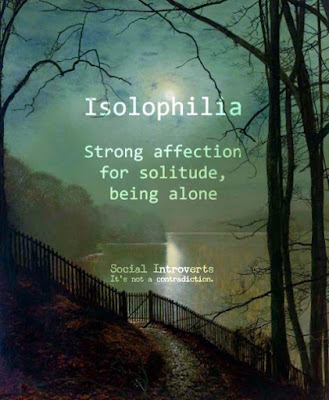Being away, alone, at one
with nature, I call that solitude. When
I am solitary I don't miss anyone. When
I with people who don't get me, who hurt me, who trivialize what I am
experiencing....that is when I feel lonely. That is when I run back and embrace
solitude.
But one can’t always live life alone.
Therefore it is important to learn and understand the behaviours of
others. Not what they say….but how they
behave! It is their behaviour that tells
us more about who.
Sometime it is best
to sit back and observe, to question:
-
How do they treat others?
-
How do they treat me?
-
How do they treat the environment? And how do they feel about those
that abuse the environment?
-
How do they emphasize with the less fortunate and the less privileged?
-
How judgmental are they? Do
they come across as entitled or superior?
-
Do they embrace black and white thinking? Especially where only they are right and
everyone else is wrong.
-
Do they get pleasure out of other people’s misfortune? Or even worse do they espouse that others deserve
their misfortune because they are not good enough or somehow flawed?
These are just some
of the things I look at when I observe and evaluate the behaviour of
others. I find it interesting that often
the ones that say “look how good I am” actually behave the exact opposite. How often have I been told “love is the
answer” by those who hate everything or any one or any belief that is different
from theirs? More than I care to
remember.
I try to embrace these benighted souls with love and compassion, for that is where they are in their spiritual journey or their healing journey.
But sometimes it gets to be too much and I
need to escape once more to solitude.
Sometimes when I
come out of solitary writing I am exhausted but left with a sense of freedom
because I have once again addressed a nugget of truth that has kept me confined
and imprisoned in unconscious behaviour patterns that kept me enslaved to the
users and abusers.
Sometimes when I come out of solitude I am invigorated sometimes I am distraught but always the reality comes back to face me, relationships require effort and work and not everyone is willing to put in the work necessary for healthy relationships.
Then for a while I
will attempt to reconnect with people, find my tribe, my belonging. Until I begin to once again wonder, where are
the likeminded souls? Where are they
hiding? Why are there so few of us? Or if there are more of us, why are we not
seen or aware of each other?
And over time as my distress builds over finding so many who are content in their not knowing; not knowing how their words and actions harm others, not knowing that theirs is not the only point of view, not knowing that that others have feelings that matter also, not knowing that there is more than one way to attain spiritual awareness.
And over time as my distress builds over finding so many who are content in their not knowing; not knowing how their words and actions harm others, not knowing that theirs is not the only point of view, not knowing that that others have feelings that matter also, not knowing that there is more than one way to attain spiritual awareness.
Over time
the wounds inflicted upon me by the insensitivity of others in their words or
actions; forces me to once again embrace the peace of solitude.
Solitude is my drug of choice. It is where I can restore my balance and my
equilibrium. It is where I can find
contentment and peace. It is where I can
recharge for another round of dealing with people in all their many insensitive
behaviour patterns.
Renate Dundys Marrello
2017 – 10 – 28
My journal blog entries are copyright.
I love when you share my page to spread the word.
If you want to quote me I kindly ask that you please provide a link back to my page.
photo credits - as marked or unknown







